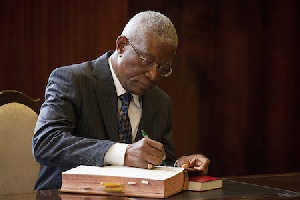Director of Communications and Advocacy of Wacam, Mr. Boakye Dankwah Boadi, has called on media practitioners to “write compelling environmental stories” that would put pressure on mining companies in Ghana to embrace the Free, Prior and Informed Consent (FPIC) and Pollution Pays Principle (PPP) concepts.
According to the former supervisory chief editor of Ghana News Agency (GNA,) media practitioners should hold mining companies accountable through their action of non-payment of compensation packages for the use of the lands and destruction of properties in mining communities in Ghana.
Mr. Boadi was speaking at the closing session of a three-day capacity building workshop on the FPIC and PPP concepts as well as rights violation in mining communities.
The workshop—which was organised in Tema—brought together journalists from Western, Ashanti, Eastern and Greater Accra regions.
He noted that government of Ghana has signed a lot of international conventions which per the country’s constitution automatically become laws and that the laws of FPIC concept of this country therefore states that: “the companies should bring on board many communities in the project affected areas to take proper decision prior to initiating activities.”
Consequently, he explained that the Polluter Pays Principle (PPP) is an environmental policy principle, which requires that the costs of pollution be borne by those who cause it.
The principle is under government’s revised environmental sanitation policy, which provides opportunity for waste generators at all corners to contribute or pay spot fines towards sustainable financing of waste management services.
But since Cabinet’s approval of the PPP and FPIC concepts, Mr. Boadi said there has not been a Legislative Instrument (LI) to detail how the two environmental policies should be implemented from the district to the national levels for the needed benefits of Ghanaians.
According to him, after almost several years of Cabinet’s backing and a directive by the current national administration to the ministry of local government and rural development (MLGRD) to take steps to ensure that the policy goes through the required legislative processes to make it enforceable in the country, the PPP still seems to be stuck on the shelves while serious polluting of the environment was going on in the country, particularly in mining operating communities.
This situation, according to Mr. Boadi, was detrimental to the country’s quest to ensure a safer environment, hence the needed steps have to be taken by the minister of local government and rural development for the PPP to have a legislative backing for a healthy Ghana.
Mr. Boadi indicated that those who pollute the environment should be made to pay for their nuisance instead of using monies earmarked for infrastructure development for that purpose.
For her part, Associate Executive Director of Wacam, Mrs. Hannah Owusu-Koranteng, noted that all communities that could potentially be impacted by extractive industry projects had the right to access full information and participate meaningfully in negotiations.
Mrs. Owusu-Koranteng said FPIC was increasingly being recognised in international law and corporate policies and was emerging as an effective method to empower communities, prevent conflicts and reduce the harmful effects of development projects in poor areas.
She said extractive companies must seek the consent of the people before initiating projects as a principle of best practice and under the provisions of the United Nations Convention 169 and other protocols of the Africa Union (AU) and the Economic Commission of West Africa States (ECOWAS).
According to her, there was no provision for consent of mining communities on the basis of FPIC and a defined legal requirement for decommissioning of mines, restoration of land, among others in the country.
Executive Director of Centre for Environmental Impact Analysis (CEIP,) Mr. Samuel K. Obiri, said though there were laws governing mining operating activities in Ghana, mining pollutes water bodies, oil, sediment and food crops at the blind side of the minerals and mining regulatory institutions.
Regional News of Thursday, 11 December 2014
Source: Today Newspaper













